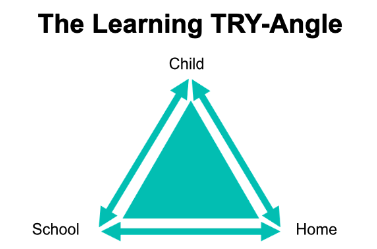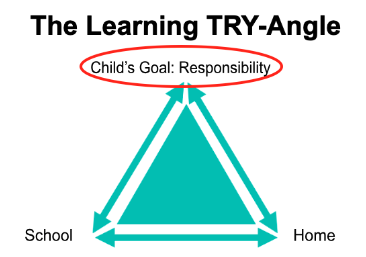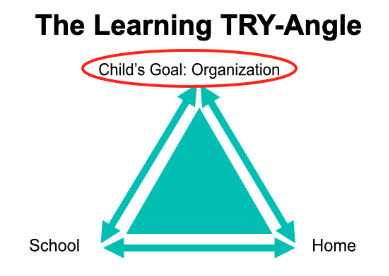Becky Stewart, Middle School Coordinator of Learning Services 2023
Helping Children Develop Skills to Solve Their Own Challenges – The Learning TRY-Angle
Many parents tend to think that the structure to support children is linear. Your child spends time at school and at home. And sometimes parents may think that just building a relationship with the school is the answer to solving problems their child may face. But this way of thinking does not support children as independent and unique participants in the process. And truly, they are the most important people in the process. So instead, I came up with a different framework – the Learning TRY-Angle.
I came up with this concept as a way to think about how when faced with a problem, we need to TRY a different angle when working to solve it. One that focuses on the child. We know that if a child isn’t interested in the outcome or doesn’t feel valued or enabled as an independent participant, they really won’t own any of the changes that need to be made, nor will they grow in their skills.
Here’s how I envision the TRY-Angle:

First up is “school”. Now this can be more than the teacher. It might be an online portal that shows homework, the google classroom where teachers want your child to upload their paper, the counselor, or maybe a learning specialist. It’s trying to connect with the right person who can help you identify the tool or help educate you, the parent, about a particular tool that is being underutilized or misunderstood by your child.
Next, we have “home”. I like to go beyond just parents and think more broadly. Maybe this is going to include parents, grandparents, siblings, therapists, tutors, and coaches. Essentially, these are all the people who help establish and reinforce expectations. I encourage parents to take the time to TRY to make a connection between your child’s entire support network and school. All these individuals can help convey the idea to your child that their independence and investment in learning is important.
Lastly, is the “child”. The most important person! Our job as both parents and teachers is to try to lift up your child, empower them, so that more responsibility can shift to them. We want to build those social emotional skills right? This framework can help them to become their own self advocate, effectively problem solve, learn independence, and communicate their needs.
Let’s go through two examples of a problem a parent of a middle school student might face and how they can might use the Learning TRY-Angle:
Problem 1: You check the school’s online portal and find a missing assignment. Your child says that it was turned in and the teacher hasn’t updated the portal yet. What new angle could you TRY to hold them accountable for their words and build responsibility?
First, I ask parents to identify the specific skill they want to target at the top of the TRY-Angle: responsibility.

One strategy you could use when you have conflicting information is to ask your child to email the teacher and cc you to get clarification. This actually has your child connect all aspects of the TRY-Angle and will help them build up their communication skills and self-advocacy skills while showing you that they want to take responsibility for their missing work. This strategy gives students an active role in the process.
Let’s move on to another scenario:
Problem 2: Your child keeps losing their jacket and you are tired of buying new ones. What new angle could you TRY to build ownership for them and help them problem solve to prevent this recurring issue?
In this scenario the item is literally getting lost along the TRY-Angle – home to school to child! Again, I’d first ask parents to identify the specific skill they want to target at the top of the TRY-Angle: organization.

Identifying the skill you want your child to build should prevent you from only implementing consequences (such as no more replacements after losing one) and instead help you focus on how to strategize with them to create a plan on how to track the item throughout the day since they need a lot of practice in this area. It’s also building those critical executive functioning skills.
If your child is prone to losing things, be sure to have them label their belongings clearly before the year starts or when they are acquired. Have them take pictures of items they bring to school regularly so they can create a visual chart with words and images and checkboxes. This visual chart could be checked off together in the morning, go with them to school in their backpack, and they could review it before leaving school at the end of the day.
You can also notify their homeroom teacher/advisor about their visual list so they can encourage your child to use it at the end of the day and if anything is missing, have your child retrace their steps or visit the lost and found. This approach strengthens their Learning TRY-Angle since everyone is supporting the same strategy to build their organization!
If your child is tech savvy, the chart could easily be put on their digital device as well.
Building skills is by no means an easy process and we all need to remember to be patient and flexible. Be sure to consistently implement any new strategy as a team to connect all aspects of the Learning TRY-Angle, but if your observations and the data show it isn’t working for your child, be sure to TRY something else! It’s important to be flexible.
I hope this framework can be useful to parents in their approach to problem solving and that it reminds them that their child’s development of skills is what will empower them to become more independent! I’ve truly found that this can help facilitate conversations, reduce stress, and anxiety, and help us reframe conversations around supporting students that are struggling in a particular area.
This is one of the many resources McLean School teachers use to help facilitate parent-child involvement and student success. To learn more about McLean’s transformative approach to education, contact the Admission Office today at admission@mcleanschool.org
By Becky Stewart, Middle School Coordinator of Learning Services 2023